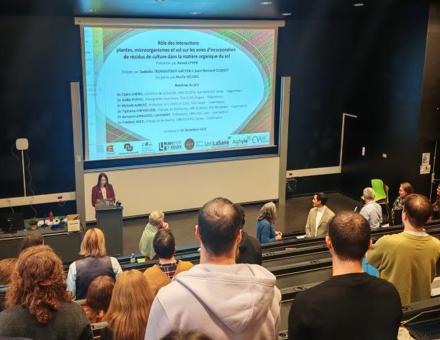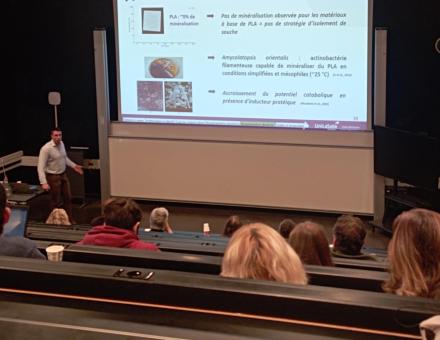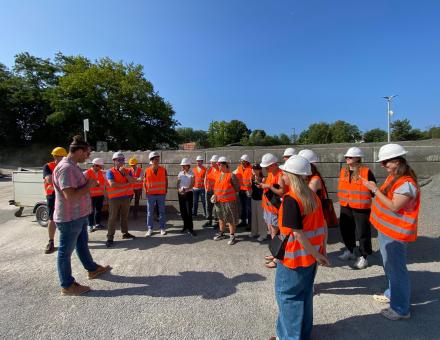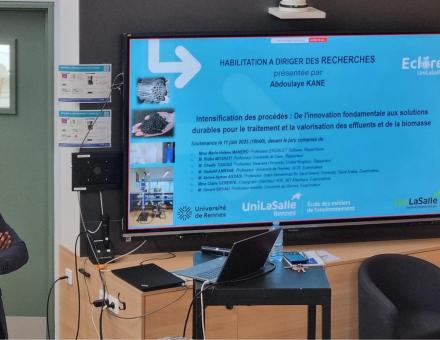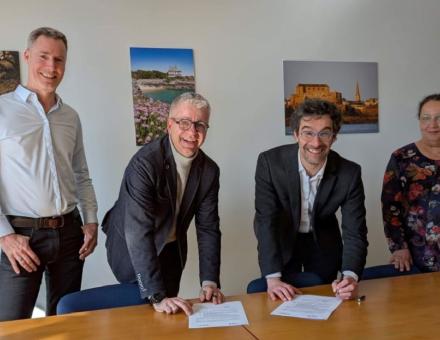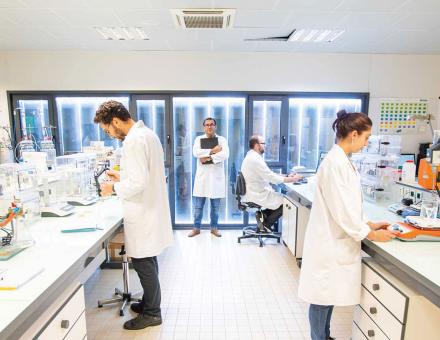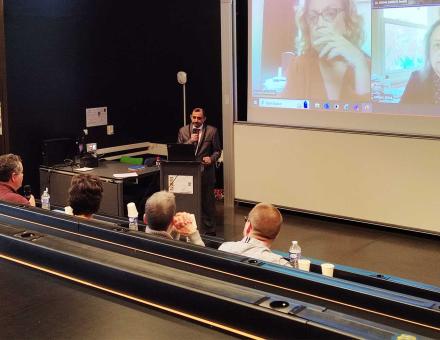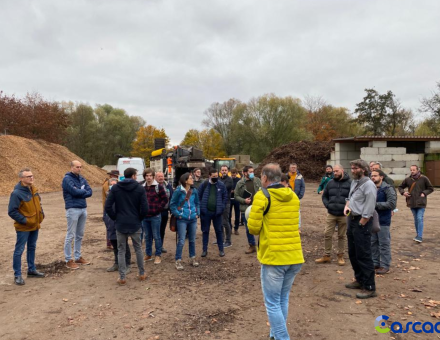The need to limit the use of fossil resources and develop multi-criteria indicators to assess the transition to new bio-based sectors in the context of climate change is now a pressing issue in our societies.
Created from the merger of the Transformations & Agroressources and CYCLANN units, the ÉCLORE unit has several objectives:
- To offer new functionalized bioproducts (ranging from molecules to materials and bioenergy) obtained from various types of biomass (co-products, by-products)
- To optimize co-valorization
- To develop systemic assessment tools using these case studies as examples.
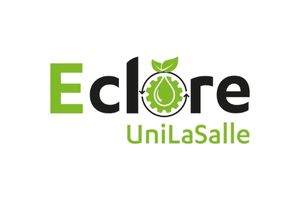
The challenges facing the ÉCLORE unit
The challenges facing the unit are to characterize the properties of biomass and co-products of agricultural and marine origin, as well as organic urban and peri-urban waste, and to analyze and understand their transformation into bio-based products in order to promote the circular economy.
These challenges are addressed through the design of regional circular economy systems (regional flows) and co-valorization in order to transition towards the efficient and complementary use of renewable materials through a systemic assessment approach, while combining biotechnical and environmental approaches.
ÉCLORE's scientific project
Thematic area no. 1 - "Characterization and functionalization of biomass for the construction of eco-designed bio-based materials "
This theme aims to select, characterize, process, and transform secondary plant raw materials, mainly lignocellulosic, by combining new co-products, such as cellulose hydrogels, in order to meet the multi-criteria functionalities and properties (physical, mechanical, chemical, thermal, biological, dielectric, piezoelectric) and multi-scale functionalities and properties of eco-designed bio-based materials.
Thematic area 2 – “Deconstruction and material/energy recovery from biomass and effluents.”
This theme aims to treat urban and agro-industrial effluents, in particular through a material/energy recovery and reuse approach, but also to promote the energy recovery of renewable resources and waste. This is achieved through solid and liquid methanisation, and through bioprocess-type fermentation activities for the environment aimed at producing energy carriers, biofuels and platform molecules.
Actualités
A multidisciplinary team of around 40 people
Beauvais Campus
- ACHA Victor
- ANDRÉ Laura
- AUSSENAC Thierry
- BUCHOU Anaëlle
- HOANG Levinh
- JEUX Victorien
- KADRI Rana
- LAKHAL Lyes
- LERZY Benoit
- MONTET Étienne
- RHAZI Larbi
Rouen Campus
- BACOUP Feriel
- BESNIER Jean-Baptiste
- BOU SARKIS Abdo
- LEBLANC Nathalie
- RAGOUBI Mohamed
- SHEHZAD Aamir
- VESPIER-MORI Samantha
- ZMAMOU Hafida
Rennes Campus
- AZZAZ Ahmed Amine
- BOULLOT Floriane
- CARIOLET Jean-Marie
- CORDRIE Benjamin
- DJELAL GOUILLAUD Hayat
- EBNER Frédéric
- FRYDA Lydia-Émilie
- GATTIN Richard
- HIGUERA Paula
- JOUAN Julia
- KAEDBEY Rouba
- KANE Abdoulaye
- LELIEVRE Ivane
- LHERBIER Reynald
- LIGNY Romain
- MERCIER Mathilde
- REVEL Messika
- ROIG Clarisse
- TARDIF Antoine
People outside UniLaSalle
- BRESSON Serge (UPJV)
Current projects
CASCADE Project - Circular Conversion Cascades to Transform Residual Biomass to Carbon Products (2023-2026)
Budget: €4 million, of which €2.4 million is funded by the European Union - INTERREG North West Europe
Objective:
Every year, 37 million tons of residual biomass are underutilized in North-West Europe (NWE), which corresponds to a potential of 30 million tons of CO2 emissions avoided, or 2.5% of NWE's CO2 emissions. Previous projects have shown that much of this biomass can be recovered and valorized to replace peat or fossil coal and create value chains with a negative carbon footprint. However, comprehensive approaches to biomass management are lacking for implementation in these regions.
This project will fill this gap by introducing circular biomass management systems in seven pilot regions via biomass valorization pathways into biochar and will create seven application scenarios that can be transferred to other regions.
As part of a transnational collaboration, a partnership of public entities, scientific institutes, and private/non-governmental R&D organizations will work on the circular design and valorization pathways for biomass:
In the first phase, biomass valorization pathways will be introduced, managed, and optimized, taking into account input variability, collection optimization, and transformation and conversion in the pilot regions at the urban and rural scales.
In a second step, regional pilot projects will be quality-checked and improved throughout a Plan-Do-Check-Act process based on technological, ecological, economic, and social criteria.
In a third step, a capacity-building program will be designed and implemented to deploy bio-based transformation pathways in these regions. A center of excellence and TechLab CASCADE will guarantee quality and offer training and development activities, roadshows, and a hybrid exhibition on bio-based products, services, and systems
Expected results:
- Successful implementation of carbon management systems in seven pilot regions, which will serve as a model for other European regions.
- Reduction of CO2 emissions through the creation of circular and CO2-neutral biomass-to-biochar transformation processes.
- Establishment of a capacity-building program, a center of excellence, and a TechLab to support ongoing training, development, and dissemination of project methodologies.
- Development of transferable application scenarios to facilitate the large-scale deployment of these systems across Europe.
Partners:
- Germany: University of Kassel (lead partner), blended learning institutions' cooperative,
- Belgium: Pro Natura operating as KiemKracht since January 3, 2023,
- Ireland: Irish Bioenergy Association,
- Netherlands: Municipality of Enschede,
- Luxembourg: Council for Economic Development in Construction
UniLaSalle contact: Lydia FRYDA
AIRCOOL National Project
Biological risk assessments and optimization of indoor air treatment processes in air conditioning systems in the food industry.
Objective
To test/develop a process combining photocatalysis and cold plasma for treating indoor air pollution in the food industry, assess health risks, and acquire knowledge about degradation mechanisms.
Partners
ISCR (CIP-ENSCR), IRSET (LERES), Pôle Cristal
UniLaSalle contact: Abdoulaye Kane
BIMGC European Project
Recycling biomass boiler ash to develop composite materials for civil engineering.
Objective
To promote the development of the circular economy in the construction sector through the implementation of a workshop dedicated to developing criteria and indicators that will serve as a scientific basis for its characterization. The research will focus more specifically on the integration into construction projects of materials or products from short supply chains or from a material cycle extension approach.
Partners
Project leader: LGCgE – IUT Béthune, Partner: UniLaSalle-EME, UMONS – Materials Sciences, Biallais Industries, Dalkia Nord Ouest – Bois Energie, CERIB, B2E, Cd2e.
UniLaSalle-EME: coordinator of a work package, Hayet Djelal (72%), Karine Dufossé (14%), Thierry Henrion (7%) Vincent Augiseau (7%)
UniLaSalle contact: hayet.djelal@unilasalle.fr
BIMGC project news
Project featured in Sustainability Magazine:
Karine Dufosse, Marine MARIE-CHARLOTTE, Vincent Augiseau, Thierry Henrion and Hayet DJELAL (2022) co-authored this article: Quantification and environmental assessment of wood ash from biomass power plants: a case study from the Brittany region in France, Sustainability
The BIMGC project is part of a wider initiative to promote the use of fly ash, a by-product of biomass heating systems. The construction industry has been selected for this project, which involves adding fly ash to concrete and/or using it as a substitute for cement. This study was made possible by a consortium comprising:
*Laboratoire de Génie Civil et géoEnvironnement - LGCgE,
* L'IUT de Béthune (62),
* The Cyclann research platform at UniLaSalle Rennes,
* the Materials Science Department of the Faculté Polytechnique de Mons - UMONS (Belgium),
* the CERIB (Centre for Studies and Research in the Concrete Industry) (28),
* Biallais Industries (62), a manufacturer of concrete blocks, and
* Dalkia Aegis, EDF Group Bois Energie Nord-Ouest (59).
The study is continuing with the BIOGRAFIC project (Valorisation of biomass ash as aggregates and fillers in construction blocks) with the same consortium and still supported by ADEME, ADEME Graine Project (2021-2023).
Completed projects
THREEC Project (2019-2023) - European call for projects INTERREG NWE 2019.
Objective:
The main challenge of the European Interreg ThreeC project is to promote the development of bio-based charcoal production chains in a sustainable manner that respects climate issues.
In France, one of ThreeC's challenges is to identify, bring together, and then form groups of stakeholders interested in biochar (bio-based charcoal) at all levels of the sector:
- biomass producers
- processors (e.g., gasification stakeholders)
- users of charcoal for water and air treatment and agricultural uses
This project aims to develop and introduce economically viable value chains based on the use of biochar from biomass waste in northwestern Europe.
Project leader: University of Kassel, Germany
The ThreeC project has a budget of €5.62 million over four years (2019-2023), co-financed by the ERDF (European Regional Development Fund) to the tune of €3.37 million.
Partners:
Cyclann UniLaSalle Rennes: Lydia FRYDA, Abdoulaye KANE, Hicham Zeghioud and AGHYLE UniLaSalle Beauvais: David HOUBEN
- 15 other European partners from Germany, Belgium, the United Kingdom, the Netherlands, France, and Ireland.
- For example, in the ThreeC France team: AILE (Association d'Initiatives Locales pour l'Energie et l'Environnement), B2E (Bretagne Eco Entreprises)
- 13 other partners from 6 European countries.
ThreeC Project News
Two types of biochar produced from flax shives and beech wood residues were evaluated for their adsorption capacity with methylene blue (MB). A series of adsorption tests with carbamazepine (CMZ) was also carried out. Post-treatment of the biochars with citric acid (CA) or surface oxidation by heating at 250°C under atmospheric conditions was carried out to modify the surface functionality of the materials. The oxidized biochars showed a high specific surface area compared to the untreated biochars. The Langmuir model showed the best fit to the MB and CMZ isothermal adsorption data. The effect of pH, adsorbent doses, and initial MB and CMZ concentrations on adsorption efficiency was also discussed.
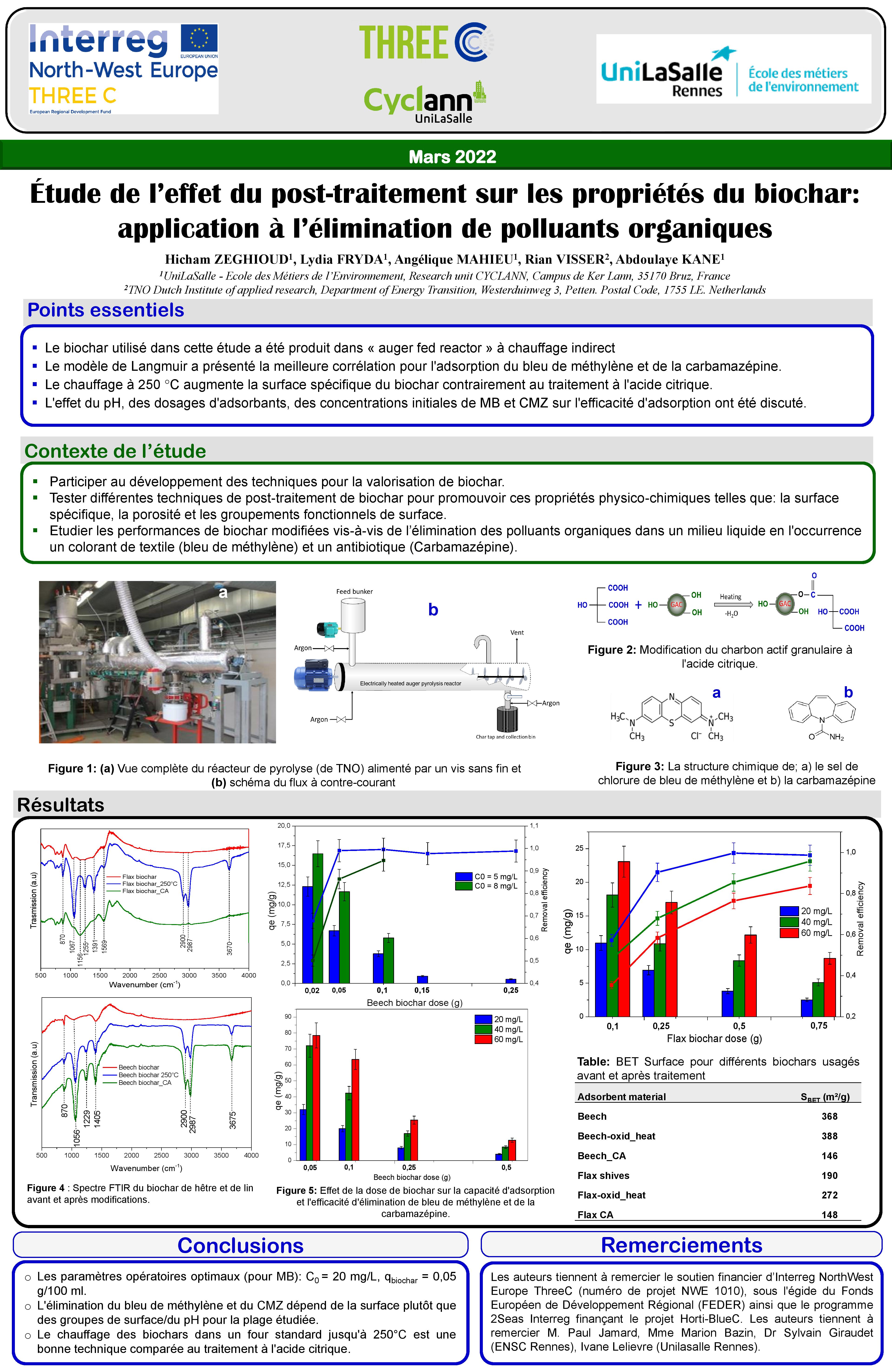
ADEME Graine BIOGRAFIC Project (2020-2022)
Recycling biomass ash as aggregates and fillers in building blocks.
Objective: recycling biomass boiler ash to develop composite materials for civil engineering.
Partners: LGCgE–IUT Béthune, DALKIA-Bois Energie France, CERIB, Biallais Industries, University of Mons (Belgium).
Contact: Hayet DJELAL
Interreg BLUEPRINT Project (2020-2022)
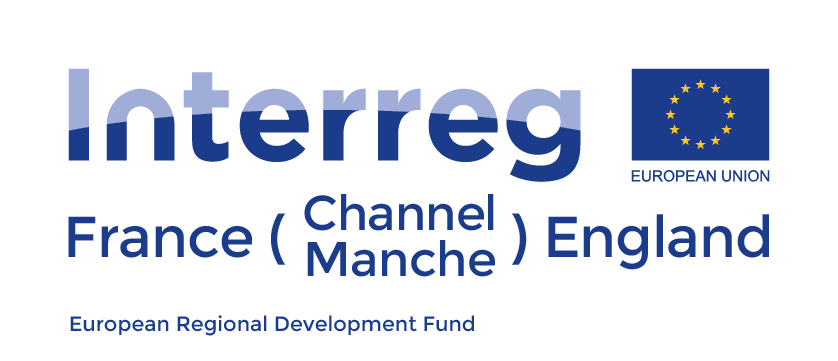 BLUEPRINT to a Circular Economy.
BLUEPRINT to a Circular Economy.
Objective:
Analysis of household and similar waste management within local authorities by providing quantitative diagnostic data on waste streams and making recommendations on how to optimize management in line with regional circular economy strategies.
The BLUEPRINT project has a budget of €5.6 million over three years, co-financed by the ERDF (European Regional Development Fund) to the tune of €3.9 million.
Partners:
Essex County Council (project leader), Kent County Council, EcoWise, Anglia Ruskin University, Peterborough Environmental City Trust, Université de Picardie Jules Verne, ESITC Caen, UniLaSalle, Morlaix Communauté and Neoma Business School.
Contacts: Lucie DOMINGO, Hayet DJELAL, Thierry HENRION, Abdoulaye KANE, Mathilde MERCIER, Delphine LE MÉEC
BIO-PAWVAL Project (2020-2023)
Designing Bio-based and biodegradable Packaging through Agriculture Waste Valorization .
Objective
The project focuses on exploring locally available agro-resources such as starch, flax, etc., for the design of bio-based and biodegradable packaging.
Partners
National Institute of Food Science and Technology, University of Agriculture Faisalabad, Pakistan.
Contact: Aamir SHEHZAD
REACT Project (2019-2022)
Objective
Develop recyclable and/or compostable barrier packaging to replace current multi-layer films, which are incinerated (44%) or landfilled (56%).
This project is funded by the European Union and the Normandy Region.
Challenges
The multi-layer film market accounts for 50% of the global flexible packaging market, which alone generates 10MT of waste per year in Europe, or 36% of plastic waste.
Fossil-based multilayer solutions meet the requirements of packaging applications, but their complex structure (assembly of different layers of polymers) makes them non-recyclable, while bio-based solutions do not currently offer all the properties required, such as barrier properties, mechanical characteristics, transparency, bacterial safety, and sealability.
The main challenge of the project is to overcome these obstacles while maintaining recyclability and/or compostability in line with the circular economy. From an economic point of view, REACT aims to establish a sector in the Normandy region for the design, production, and recovery of recyclable and/or compostable barrier plastic packaging.
Partners
IPC (coordinator) • UniLaSalle • University of Rouen - PBS • Praxens • ISPA Entreprise • Polytechs SA • Bischof + Klein France SAS (B+K)
Launch date: 01/06/2019
Duration: 37 months
Funding body: EU / Normandy Region
Total project budget: €2.6 million
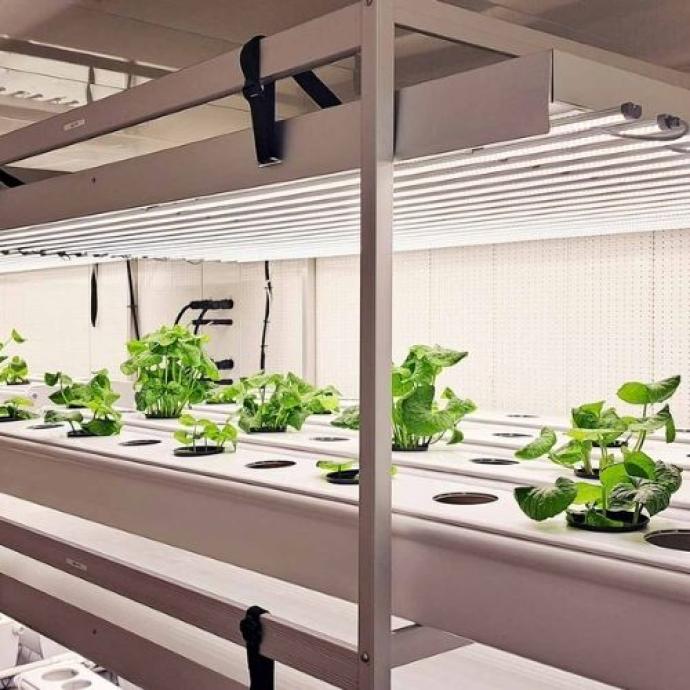
Platforms
- AgroBioTech (Rouen campus);
- LaSalle O3 (Beauvais campus);
- Methane production (Beauvais campus)
Networks and partners
- GDR MBS Office, GDR ECOTOX
- Competitiveness clusters B4C, Cosmetic Valley, Team2, Euramaterials, Valorial, Vegepolis, SFGP, ECOSD
- RNM (COP21, action coalitions) Cluster B2E; SFR Normandie Végétal FED 4277

